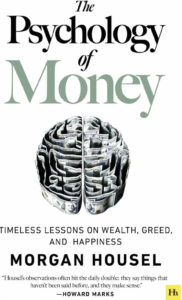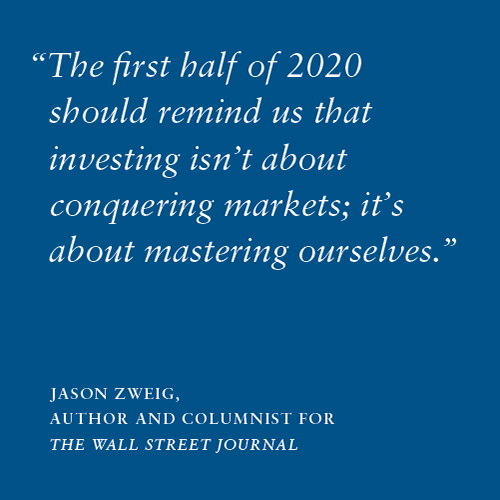Details Are Part of Our Difference
Embracing the Evidence at Anheuser-Busch – Mid 1980s
529 Best Practices
David Booth on How to Choose an Advisor
The One Minute Audio Clip You Need to Hear
Tag: Jason Zweig
#1 New Release in Investing Books

The next book about money we plan to read is The Psychology of Money – Timeless lessons on wealth, greed, and happiness. It is scheduled to be released on September 8th and is getting the buzziest reviews we have heard about any finance book in 2020. It’s authored by Morgan Housel, who readers of this email will recognize. Housel uses 19 short stories to explore the way people make financial decisions. “Important decisions are often made at the dinner table, where personal history, your own unique view of the world, ego, pride, marketing, and odd incentives are scrambled together.”
“It’s one of the best and most original finance books in years.”
Crazy Times – Same Long View
 In his recent piece about investor behavior, Wall Street Journal Columnist, Jason Zweig profiles real investors who took the long view in the int first half of 2020. “Markets Bombed, Investors Carried On” reminds us why maintaining self control in a volatile market is key for long term success. Our favorite quotation? Arlyne Willcox said, “My experience in 2008 told me: Stand still, be patient, take baby steps so you don’t overreact but feel like you did something.” We couldn’t have said it better ourselves. You can check out the rest of the piece here.
In his recent piece about investor behavior, Wall Street Journal Columnist, Jason Zweig profiles real investors who took the long view in the int first half of 2020. “Markets Bombed, Investors Carried On” reminds us why maintaining self control in a volatile market is key for long term success. Our favorite quotation? Arlyne Willcox said, “My experience in 2008 told me: Stand still, be patient, take baby steps so you don’t overreact but feel like you did something.” We couldn’t have said it better ourselves. You can check out the rest of the piece here.
Stockmarket Turns into the Casino During Coronavirus

Wall Street Journal columnist, Jason Zweig, reminds us why trying to play the stock market is like gambling at a casino. Read it here.

